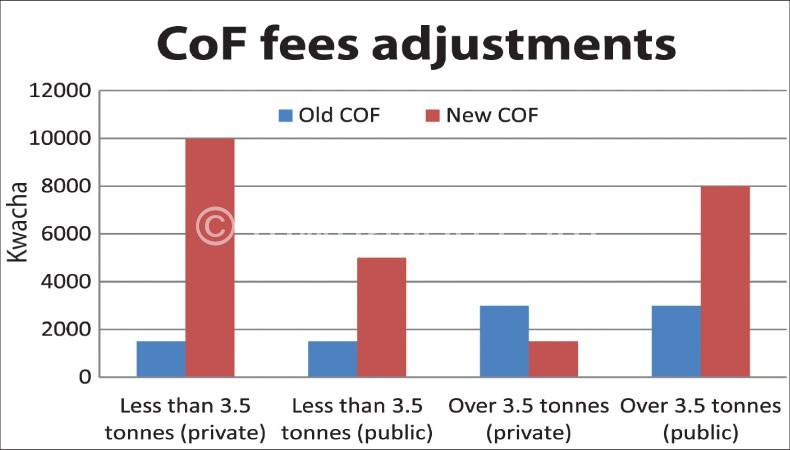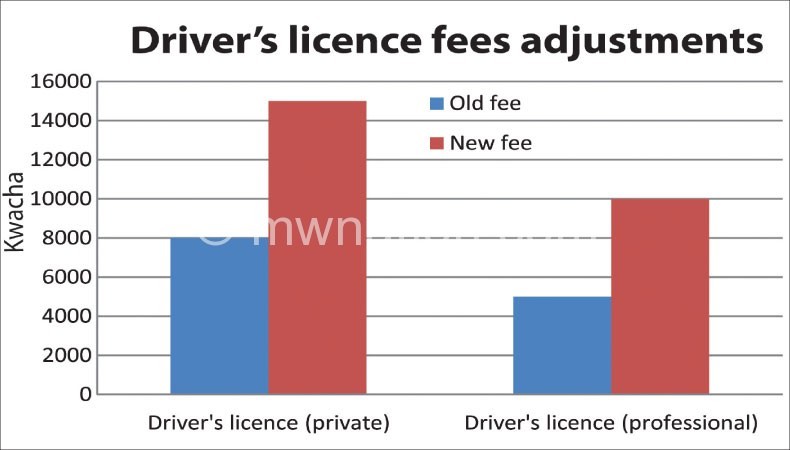Govt punishes car owners
 Capital Hill appears to have found some sort of a clue to the puzzle that is its ever widening fiscal yawn: punish success.
Capital Hill appears to have found some sort of a clue to the puzzle that is its ever widening fiscal yawn: punish success.
If you worked hard enough to own a vehicle or plan to buy one, brace yourself to pay at least three times more for its official examination leading to award of a Certificate of Fitness (CoF).
You should also be prepared to cough double the fines for traffic offences and road traffic services.
Nation on Sunday
has obtained the new charges after the Directorate of Road Traffic and Safety Services (DRTSS) vaguely announced without providing figures that it will from October 1 2014 implement new and adjusted fees for services and fines.
DRTSS spokesperson Chisomo Chibwana confirmed the new fees and fines in an interview on Friday.
She explained that the directorate proposed the fees to the Ministry of Transport for approval by the minister after which the new charges were gazetted into law.
The rates of increase, according to some vehicle owners, are too high given that the people targeted—the middle class—are the very same who pay the bulk of taxes.
–New fees–
 Fees for examination of a motor vehicle to get a CoF for a private car of a gross weight of less than 3.5 tonnes have jumped 667 percent from K1 500 ($4) to K10 000 ($26).
Fees for examination of a motor vehicle to get a CoF for a private car of a gross weight of less than 3.5 tonnes have jumped 667 percent from K1 500 ($4) to K10 000 ($26).
On the other hand, the fee for the same service for public vehicles such as buses have risen from K1 500 ($4) to K5 000 ($13), representing a 333 percent hike.
CoF for private use motor vehicles with a gross weight of more than 3.5 tonnes is up 500 percent to K15 000 ($40) from K3 000 ($8) while a public vehicle of the same type will be examined at K8 000 ($21), translating to a 167 percent climb.
With the total number of vehicles in Malawi estimated at 250 000, government is expected to haul K2.4 billion (about $6.3m) annually on average from CoF alone.
This projected revenue is higher than the K562.5 million on average that we estimate government collected on the service before the adjustments—meaning that Capital Hill is set to rake in nearly four times what was being collected before.
The fee for applying a driver’s licence expiring after five years has surged 87.5 percent from K8 000 to K15 000.
On the other hand, application fee for the two-year professional driving licence—mostly used by minibus and heavy duty motor vehicle drivers—has doubled to K10 000 from K5 000.
According to Chibwana, the increments will also affect fees for the registration of motor vehicles.
First time vehicle registration fees is now K15 000 from K10 000, a 50 percent reap, while fees for duplicate certificate of registration has also risen from K10 000 to K15 000.
–New fines–
Apart from the services at Road Traffic, the directorate has also compounded all the notable traffic offences into one called “failure to furnish documents in respect of motor vehicle, name and address, professional driving permit, licence or information regarding identification of driver contrary to Section 7 (1) and 8 of the Road Traffic Act and will be fined at K5 000”.
These offences previously had various fines ranging from K1 500 to K3 000.
Other offences such as failing to stop a vehicle or change directions and driving a vehicle after being forbidden by traffic law enforcement will be fined at K8 000.
The increases have enraged some vehicle owners such as Shadreck Matsimbe who, in an interview on Saturday, expressed shock at the “exorbitant increases”.
“They want to kill [us],” said Matsimbe who, until two years ago, was chief executive of Road Transporters Association of Malawi.
Another motorist, Alfred Kalimba of Blantyre, said government was ripping off Malawians through increases in services without considering that people are already paying high taxes on their incomes.
“What this means is that government is punishing successful people,” he observed. Kalimba said most people who own vehicles are the same ones that already pay huge income taxes to the Malawi Revenue Authority (MRA).
He, therefore, said squeezing the same category to deal with a fiscal crisis of Capital Hill’s own making is unfair and demotivating to the most productive social class.
–Kapito is happy–
But Consumers Association of Malawi (Cama) executive director John Kapito welcomed the increments, saying it was necessary as the current fees or charges for road traffic services have been low for a long time.
He said it was unfortunate that in Malawi it would seem that for a long time the poor were subsidising the rich as most of the services provided by the directorate are offered to individuals and companies with the capacity to manage the higher costs.
“I find these costs justifiable on the understanding that quality of service delivery will improve significantly,” he said.
In a press release preparing the public for the impending increases, the directorate said the adjustments were effective on July 1 2014, but collection of the fees will start from October 1 2014.






I think the writer does not love Malawi. Look the charges you are talking about have been like before devaluation of two years ago. Frankly speaking, government was undercharging. It is the same with passport. The reason why we are having problems is because the cost of the passport is anot a true value. This breeds corruption. If you allow the price to be cost reflective, we should not have problems of passpors, drivers licenses taking longerbtime to produce. It should be a straight forward case. Instead of government subsidizing thse services, let the total cost be borne by the individuals. Government should then hopefully use the savings in other vital areas like health